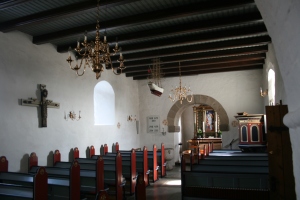Members of the official church have decreased throughout the years; however, immigration has brought diversity to the country´s religious environment.
By Carolina Krause
The religious context of Denmark is changing. In 2012, members of the Evangelical Lutheran Church – the country’s official, which is subsidized by the government – counted for 79.8 per cent of the population, according to the Statistical Yearbook. This percentage is 0.6 per cent lower than the previous year and 4.5 per cent less in comparison to the prior decade. Numbers are still much inferior when considering attendance to Sunday services, which is only about 5 per cent.
Immigration and dissatisfaction with the church are the main reasons for this change, according to the Associate Professor of the Department for the Study of Religion of Aarhus University, Jesper Sorensen.
“Protestantism has an internal issue. It has reemphasized its rituals and people start to question why to participate”, he says in interview.
The urbanization process and the Danish welfare system, he adds, may also contribute.
“Being in an insecure environment leads people to search for the supernatural”, he explains, “agricultures and fisherman, for example, who are completely dependent on what they can get and grow, tend to be more religious in order to feel more secure”.
On the other hand, the specialist mentions, people who can trust in their institutions are less likely to search for the divine.

“Being in an insecure environment leads people to search for the supernatural”, explains Jesper Sørensen. Photo taken from AU website
For Ole Jorgensen, a Danish engineer, it is a cultural matter to participate in ceremonies at the official church, even though the citizen is not a practitioner. “It´s part of our culture to be baptized, to get confirmation, to get married in church. We also celebrate Christian holidays. However, many Danes don´t even believe in a God”, he comments.
Jorgensen was baptized in the Lutheran church, but he converted to the Evangelical later.
“Here I learned to have a more personal relation with God”.
Foreigners increase diversity
Since the Constitution granted religious freedom in 1849, citizens have been able to migrate to different churches. Nowadays, there are 71 officially religions recognized outside the Lutheran. The high number of immigrants, who currently count for 10,7 per cent of Denmark’s inhabitants, (they were less than 7 per cent in 2007) also brings diversity to the country´s religious background.
The second largest religious community in Denmark is the Muslim, which constitutes 3.7 per cent of the population, according to official statistics. Christian and Christian-oriented groups follow with around 3 per cent of the population. The group of individuals without pronounced religious allegiances, which contains Buddhism and Hinduism, for example, counts for around 13 per cent.
Aarhus, for instance, represents this variety of churches. Apart from Christian basilicas, such as Roman Catholic, Baptist, Methodist, Anglican and Russian Orthodox, there is also a Buddhist temple. Moreover, a Mosque and Islamic Centre is intended to be constructed.
Many churches have offered either services in English or live translations to this language for welcoming international people. Amy Emerson, an American event’s organizer, was glad to find a church where she didn´t have to struggle to understand services in Danish. “Here they make the internationals feel very welcome. About 30% of the people are from other countries”, she says.
Depending on the nationality, non-native English speakers may also find church activities in their mother language. The Singaporean student Wen Jia Chang, for instance, was approached in the streets by religious representative searching for Chinese speakers to take part in a bible study. “The lady was very friendly and gave me her card in case I am interested. However, I don´t think about going to church here”, she comments.
